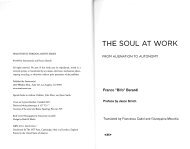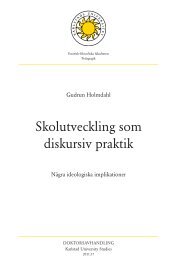FULLTEXT01
FULLTEXT01
FULLTEXT01
You also want an ePaper? Increase the reach of your titles
YUMPU automatically turns print PDFs into web optimized ePapers that Google loves.
depending on time and context will be seen as controversial, while others willbe taken for granted. This means that there also exists an inseparablerelationship between the way of arguing, and what can be perceived asideological implications (Billig, 2005, 2009: Billig, Condor, Edwards, Gane,Middleton, & Radley, 1988). The analytical tools used in the study areinterpretative repertoires and ideological dilemmas.The analytical concepts of interpretative repertoires and ideological dilemmaspartially intertwine, because both can be understood as descriptions ofrhetorical resources and discursive strategies, which are more or less available ata particular historical moment. To that extent, the concept of interpretativerepertoires represents some of the material in the „common sense‟, of which adiscursive practice is constituted. The concept of ideological dilemmas impliesthat the method of combining different interpretative repertoires around thesame social phenomenon, i.e. the design of the argumentation, can be regardedas a rhetorical construction, conditional on the specific common sense of onediscursive practice (Edley, 2001). That means that also particular ways of sayingor writing something at a certain moment will seem more natural than otherways.The analysis aims to detect and to identify the interpretative repertoires that areused, the ideological dilemmas that are present, as well as determine how theyare separated from one another, as well as how they intertwine (Edley, 2001).One should as a part of analysis also note what is not being challenged orquestioned, or understood as obvious and normalized, while this is alsoconsidered to be a part of the discursive practice. Also paradoxes, tensions andsignificant shifts in the arguments and what can thereby gain credibility, shouldbe considered in the analysis, which is to include ideological implications of thediscursive practice in the analysis. Empirical studies have namely shown thatsuch discrimination may well be achieved by an argument which not „purportsto be‟ discriminatory (Billig, 2005; Wetherell & Potter, 1992). Although, I donot pay attention to „subject positions‟ very explicitly in the study, this must beregarded as an inevitable aspect of both interpretation repertoires andideological dilemmas, because subject positions are seen as a part of everydiscursive structure.Within a broad sense postmodernly-oriented discourse analytic field, where Ibelieve my study can be placed, truth and reality are considered as somethingrelative and something dependent on a currently existing discourse (Wetherell,2005). Therefore a relativistic approach may also have implications on the173






